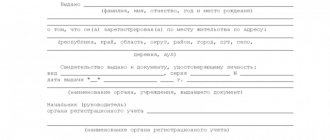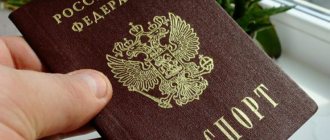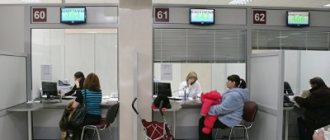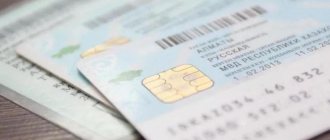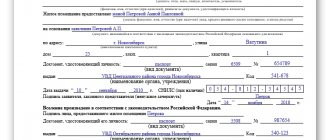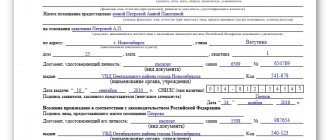Home / Real estate / Housing rights / Registration / Temporary registration at the place of stay
Back
Published: September 26, 2017
Reading time: 5 min
1
547
According to the laws of the Russian Federation, every citizen must inform the state about a change of place of residence. Registration can be issued at the place of permanent residence of a person or temporary stay.
In any case, failure to comply with this rule entails administrative liability.
- Grounds for registration
- When can you live without registration?
- Features of registration for hotel guests
- Registration process
- Waiting time and state duty
Registration at the place of residence: concepts and features of the procedure
The ability to choose a place of residence and stay is guaranteed to citizens by Art. 27. This right, in accordance with Art. 150 is protected by law.
According to paragraph 1 of Art. 20 of the Civil Code of the Russian Federation, a place of residence should mean a premises in which a person permanently/primarily lives and uses it as an owner, on the basis of a rental agreement, and so on. The following may serve in this capacity:
- residential buildings,
- apartments,
- rooms,
- specialist. housing premises.
Registration of a citizen of the Russian Federation at the place of residence is carried out in objects endowed with the status of residential premises. In this case, residence must be clearly defined as permanent or primary, and the tenant has legal grounds for exploitation: ownership, rental agreement or others.
Apartment search
In fact, getting a mortgage in another city is easier than finding a suitable property. If you are planning to purchase a secondary market property, then it is unlikely that you will be able to select real estate without your personal presence. Having chosen an apartment based on an advertisement, you still need to actually see it and conduct a visual assessment.
There are a lot of fakes on message boards, a lot of false information. Therefore, if you do not want to be deceived, you will have to go to the property, look at it, and check the seller’s documents. In this case, there is no point in leaving; you will already be there and complete the deal.
If you are planning to buy a secondary market property in another city, first get approval from a bank in your city. Afterwards he will give 90 days to search for the object. Find him in another city, collect documents and complete the process at a branch of the same bank.
If you plan to purchase a new building, everything is much simpler. Developers have also developed remote sales channels through which you can actually make a purchase without leaving your hometown.
All developers maintain websites for properties, post full information, apartment plans, prices, delivery dates. Based on this information, you can select a residential complex and an apartment remotely and immediately contact the developer to purchase by phone or by leaving an online application.
If you have chosen an apartment, call the developer and find out about the possibility of remote sales. He is interested in the transaction, so he will assist you at all stages, including conducting a dialogue with the bank. But it is important that it is a partner bank.
Classification of fines
As you know, at the age of 14, Russians receive an internal passport, in which a number of marks are made. One of them is about registration at the place of residence. The need to obtain a residence permit is provided.
In accordance with the Resolution, citizens who have changed their place of residence are required to contact the relevant authorities with an application for registration within 7 days. This requirement also applies to minors, who are issued a certificate instead of a mark in their passport.
Those who have not registered should be aware that their actions are subject to sanctions, which include a fine for living without registration (Article 19.15.1).
The Constitution of the Russian Federation allows citizens of the country to move freely throughout its territory. However, there are legal restrictions. The period of stay in a new place cannot exceed 90 days. There is no need to neglect this requirement, thinking that no one is in control of the situation. If a citizen’s actions attract the attention of law enforcement agencies, he will have to pay a fine for temporary registration.
Those who violated the rules of residence in federal cities will have to pay much more.
Punishment is provided not only for citizens without registration, but also for owners (tenants) of housing who allow persons without registration to live on their premises.
If a citizen of the Russian Federation does not have a residence permit, the legal entities that provided them with premises for permanent or temporary residence will also be held administratively liable.
How much will you have to pay for late registration?
The legislation of the Russian Federation obliges citizens living in the country to obtain registration within a strictly defined time frame. As mentioned above, you can stay away from your place of residence for no more than 90 days. Violators of this requirement will have to pay a fine for lack of temporary registration. Today its size is 2000 - 3000 rubles.
Homeowners will also be held administratively liable. They will pay from 3,000 to 5,000 rubles.
Much more serious punishment awaits enterprises and organizations. A legal entity that commits this offense will be forced to pay 250 - 750 thousand rubles.
Detailed information can be found in the article “Fine for late registration”.
Fine for missing a stamp in your passport
Without registration it is impossible to use various social benefits. Its absence is also grounds for prosecution. A protocol is drawn up regarding the offender’s case. Punishment is not imposed for days of delay. The fine for lack of registration in the passport in 2021 is paid upon detection of the offense by an authorized person.
Unfortunately, not every Russian is a home owner. Many have to live in rented apartments. Property owners are rarely willing to register their tenants. As a rule, owners:
- they fear that registered temporary residents will lay claim to their property:
- seek to avoid paying taxes.
However, if it turns out that a person lives in their apartment without registration in their passport, the amount of tax will increase by the amount of the fine.
In accordance with Part 3 of Art. 19.15.2 of the Code of Administrative Offenses of the Russian Federation, violation of the statutory deadlines for notifying registration authorities about a citizen’s residence in the premises is grounds for bringing to administrative responsibility.
Detailed information is presented in the material “If a citizen does not have registration in his passport.”
Sanctions for living outside the place of registration
Those who do not live at their place of registration will have to pay a fine of 2–3 thousand rubles.
About who can be punished for such an offense and what exceptions to the rules exist, see the article “Responsibility for living at a location other than the place of registration.”
More severe punishment is provided for legal entities. They will have to pay from 4,000 to 7,000 rubles. Citizens and organizations that provide knowingly false information to the registration authority will be fined the same amounts.
The law provides for cases when a fine for living outside the place of registration is not charged. The following will not be held liable:
- persons who have violated the registration rules established by law, if they are close relatives of the owner (tenant) of the premises in which they live;
- owners (tenants) of residential premises for failure to provide information about the residence of persons in their housing without registration, if the person is registered in the same locality where he lives.
For cities of federal significance, it is enough to have registration in the Moscow or Leningrad regions, as well as in any locality in Crimea.
Penalty for expired registration
An analysis of the legislative norms regulating the procedure for registering citizens shows that they do not provide for a fine for overdue registration. There is no such concept in law at all. They can be held administratively liable only for violating the terms of registration at the place of temporary stay or residence.
A citizen will face punishment for lack of registration if he, having changed his place of residence, does not submit documents for registration within 7 days.
Problems with the law will also arise for those who have not registered at their place of temporary residence, provided that the citizen does not live at his place of registration for more than 90 days.
Persons planning a move, long-term business trip or travel should read the article “Fine for expired registration”.
Amounts of fines in federal cities
Citizens are held accountable for living at their place of stay/residence without registration, regardless of where the offense was committed. However, you will have to pay much more for ignoring legal requirements in federal cities.
According to Part 2 of Art. 19.15.1 of the Code of Administrative Offenses of the Russian Federation, the fine for failure to register at the place of stay (residence) in Moscow or St. Petersburg ranges from 3 to 5 thousand rubles.
Tenants or owners of premises in which persons without registration live will have to pay 5,000 - 7,000 rubles. The size of the fine imposed on legal entities ranges from 300 to 800 thousand rubles.
If the child is not registered
In accordance with the legislation of the Russian Federation, minor citizens must be registered together with their parents or with one of them if the child lives in a single-parent family.
The fine for the lack of registration of a newborn is paid by the parents. The payment amounts are provided for in Art. 19.15.1 Code of Administrative Offenses of the Russian Federation.
You should not delay registering your child. The consequences of not registering at the place of residence are the impossibility of registering maternity capital and other social benefits, as well as receiving targeted medical care. Consequently, parents themselves are interested in registering their child on time.
Persons over 16 years of age may be subject to administrative liability.
Acceptable length of stay
Depending on the type of registration, the legislation sets deadlines for registration with migration authorities. For temporary registration, this is a three-month period or 90 days, while permanent registration is limited to just 1 week. Such time frames are prescribed in Government Decree No. 713 of 1995.
This rule means that no later than 7 days after moving to a new place of residence, a person must register with the Federal Migration Service and put a mark in the passport with the new address.
If, after being discharged from the old place of residence, a person does not purchase a new apartment for a long time, then he must register at the place of his actual residence within 90 days and register there temporarily.
How to pay a fine
The fine for living without registration as a citizen of the Russian Federation is paid after drawing up a protocol or issuing a resolution. The document specifies the details to which the required amount should be transferred.
Those held accountable can challenge the decision of the administrative authorities. The complaint must be filed within 10 days after its acceptance. Otherwise, it will come into force and the citizen will have to pay a fine for violating registration at the place of residence.
Who is authorized to issue fines?
The decision to impose administrative liability is made by the court. Protocols are drawn up by representatives of law enforcement agencies after conducting scheduled raids organized after receiving the appropriate signal.
Typically, the initiators of such checks are vigilant citizens. And this is not surprising. The number of terrorist attacks and provocations has forced Russians to more closely monitor those who live nearby.
Options for paying a fine
The offender is obliged to pay a fine within the period specified by law after the decision is made or a protocol is drawn up. There are several ways to transfer funds to the budget:
- Visit the nearest bank branch.
- Use the self-service terminal.
- Use Internet banking or the State Services portal.
The choice of option depends on the capabilities of the debtor, availability of free time and access to the Internet.
Transfer of funds through a bank
Administrative fines can be paid at almost any Russian bank. Most financial institutions do not charge a fee for this service.
Payers should remember that there is usually some delay in payment. Therefore, you should not delay paying the required amount.
The receipt must be kept for three years. It is confirmation of timely and full payment.
Self-service terminals
To pay an administrative fine, you can use a self-service terminal. The main advantage of this option is that it is not tied to the working schedule of banks.
When choosing this method, you should carefully consider entering the details. Any inaccuracy will result in the payment not reaching the addressee. The payer will not only lose money, but will also be forced to explain to government officials the reason for late payment.
Paying fines online
Many Russians use Internet resources to pay fines. The most popular of them are the State Services portal and Sberbank-online. Having a personal account on the State Services website will allow you to quickly and effortlessly make a payment. However, the registration procedure and especially user identification takes a considerable amount of time. If a citizen does not have a personal account, it is easier to use Internet banking.
Sberbank of Russia offers clients to pay almost any fine online. To perform the operation, the user must have a valid bank card, mobile phone and connection to Mobile Banking.
To register on the site, you need to visit. In the upper left corner there are fields that are filled in when logging in. Below them is the “Registration” button.
Registered citizens can log into their personal account and select the “Payments and Transfers” tab.
After pressing the button, the system will transfer the user to a page where he must select “Staff Police, taxes, duties, budget payments.”
Then you need to find the organization to which the payment is transferred. The data is easy to find out from the resolution or protocol. To search for a recipient, you can use a special line by entering the name of the organization or its current account.
On the next page the user must:
- Enter the necessary details into the system and click the “Continue” button.
- Enter the payment amount and select the source.
- After filling in the fields, press the “Confirm via SMS” button.
A message will be sent to your phone with a code that must be entered in the appropriate field to complete the operation.
It is advisable to print out the receipt and keep it for 3 years.
Details for paying a fine
To pay a fine, the offender must know the details. Information on where to transfer funds can be found in the protocol or resolution, and can also be obtained from the Main Migration Department of the Ministry of Internal Affairs of the Russian Federation at your place of residence.
Most banks that accept such payments are also willing to provide this data. When filling out the receipt yourself, you need to make sure that the information is entered correctly.
Sample receipt for payment of a fine
A receipt for paying a fine for an administrative offense can be obtained from the Main Department of Migration Affairs of the Ministry of Internal Affairs of Russia or from any bank branch. Samples of filling are usually located at the stands of these institutions. The document looks like this:
The details specified in the resolution (protocol) must be entered in the provided fields and payment must be made.
Deadlines for payment of fines
If a citizen does not intend to appeal the protocol or decision for violating the rules of registration at the place of residence / temporary stay, he must pay the assigned fine within 60 days.
This event should not be postponed until the end of the specified period. Bank transfers are not instantaneous, so the payment may not reach the recipient on time.
How to choose a bank for a non-resident mortgage
As an example, we will immediately consider a specific option: a person lives in Perm and intends to purchase real estate in Moscow. But he does not intend to live in the capital; he is buying an apartment for investment or renting out. That is, in fact, he needs to complete the transaction as remotely as possible, so as not to waste time and money on flights, accommodation in the capital, etc.
Most often, just such situations occur - the borrower lives and works in one city, but wants to purchase real estate in another. And the most important thing is to find a bank that meets the following parameters:
- works in both cities, in our case, both Perm and Moscow;
- offers the most convenient remote format for obtaining a mortgage. Preferably, a separate mortgage portal where you can not only apply for a loan, but also select a property.
Since the onset of the pandemic, banks have reconsidered their approach to issuing mortgage loans. Many have taken the process online as much as possible, making it easier to get a mortgage in another city.
If you have already looked at some property remotely, then in the case of a new building, find out which banks have accredited the house. Fortunately, developers now maintain their own websites and create websites for individual properties, where you can get all the information about apartments, prices and through which banks you can get a mortgage. Accordingly, this bank must also operate in the city of residence of the borrower.
If we talk about specific banks, the most convenient services are offered by Sberbank, Rosbank and VTB. They allow you to maintain personal accounts for borrowers, through which you can perform some actions online. But the best remote registration service is Sberbank.
If you want to get a mortgage in another city, we recommend that you first consider the offer of Sberbank (aka DomClick). They built the process so that the purchase and loan processing part can be completed completely remotely.
Appealing a fine
In accordance with the legislation of the Russian Federation, citizens have the right to appeal the protocol/resolution on bringing to administrative responsibility for living without registration within 10 days. However, the plaintiff must have grounds to file a claim. They will have to be documented.
If there are no compelling grounds for appeal, the application may be left without consideration or the court may refuse to satisfy the claim.
A careful study of the legislation will allow us to determine which categories of citizens may not pay a fine. It is advisable to obtain legal advice. If necessary, he will take upon himself the preparation of a statement of claim.
Certificate of absence from where registered
Attention: in some cases, the fact that a person is not actually located where he is registered must be documented.
This is necessary, for example, if the resident does not participate in paying for utilities and the owner intends to prove the loss of the right to use the premises and evict him.
In order to record the fact that a person does not reside at the place of registration, it is necessary to draw up the appropriate document. This is what the act is.
Act
Drawing up an act of non-residence at the place of registration is within the competence of:
- officials of housing organizations;
- district police officers;
- officials of registration departments of law enforcement agencies;
- bailiffs.
The act is drawn up in the presence of the owner, tenant and other residents. It should indicate:
- Date and place of compilation.
- Composition of the commission - last names, first names, patronymics, passport details, positions held.
- Information about those present.
- Information about a non-resident person.
- Residential address.
- No signs of actual residence - personal belongings, sleeping place.
- Signatures of the commission members.
The procedure can be initiated by the owner or the tenant. After drawing up the act, it is submitted for certification to the management company or homeowners association. After this, it can be used as evidence in court.
Who is exempt from liability for living without registration
Some categories of citizens are not held accountable for lack of registration. Their list is presented in Art. 19.18.2 Code of Administrative Offenses of the Russian Federation. Close relatives of persons registered in this premises are not fined for violating the passport regime. These include:
- parents,
- children (including adopted children),
- grandmothers,
- grandfathers,
- spouses.
Tenants (owners) of residential premises will not be punished, provided that the citizens living with them are registered in the same locality.
If we are talking about cities of federal significance, then registration is taken into account not only in the locality itself, but also in the region. So, for example, liability for lack of registration does not occur if a citizen lives in St. Petersburg, but is registered in the Leningrad region.
What is acquisitive prescription
Acquisitive prescription is one of the ways to obtain ownership of property, along with purchase, inheritance, receipt as a gift, etc. This right is based on Article 234 of the Civil Code.
Guided by the principle of acquisitive prescription, a person can register ownership of real estate after living there for many years. The difference with other methods of obtaining property rights is that with acquisitive prescription the owner does not bear the costs of purchasing and forming the property. That, however, does not prevent him from becoming its owner.
At first glance, everything is simple, but in reality, getting approval from the court to recognize rights is very difficult. The owner has to prove a complex of circumstances. Obtaining property rights after the expiration of the acquisition limitation period is permitted only if five conditions are simultaneously met :
- open ownership of property - a citizen did not hide from other persons the location of an apartment or land plot in his property, but he should not specifically notify about his ownership in any way;
- continuous - a citizen owned real estate for a long period of time and it did not cease during this period (with the exception of short-term periods - for example, renting out property);
- possession for at least 15 years (to this time you can add the period of use of the property by the previous owner - the testator);
- conscientious;
- ownership of property as one's own .
Thus, a person who in good faith, openly and continuously owns the property as his own for 15 years or more can register ownership of property according to the principle of acquisitive prescription.
One of the most subjective criteria for recognizing property is good faith, which courts interpret in different ways. It is considered that the owner who was not aware of his lack of ownership rights to the object due to the absence of claims on the part of other persons to use the object is considered to be in good faith. But in judicial practice there is an approach according to which knowledge of the illegality of one’s possession does not exclude good faith. In any case, the issue of good faith will be resolved on an individual basis.
The concept of fictitious registration
A more serious offense is fictitious registration, which means:
- registration in residential premises without living in it;
- registration on the basis of false data or forged documents;
- obtaining registration without the consent of the owner (tenant) of the property.
For this act, the law provides not only administrative liability, but also criminal liability. In accordance with Art. 322.2 and 322.3, the violator expects:
- fine from 100 to 500 thousand rubles;
- ban on holding a certain position (conducting activities) or forced labor for a period of up to 3 years;
- imprisonment for up to 3 years.
Detailed information in the article “Fictitious registration: how to verify the authenticity of registration.”
Who can register property by acquisitive prescription?
For a long time, the prevailing approach in judicial practice was that Article 234 of the Civil Code applied only to ownerless property - which has no owner or is unknown. But now the courts are based on the principle that the presence of an owner of real estate is not a barrier to re-registration of rights in favor of another person. This is possible if the owner does not live in the apartment for a long time and does not pay for its maintenance. Moreover, it does not matter whether the owner had plans to sell or donate the property.
Indicative in this regard was the decision of the Supreme Court in case No. 4-КГ19-55. The court decided on the legality of the plaintiff’s demands to give her the second half of the house, since the heirs had not used the property for a long time (more than 15 years). They did not appear in the house for a long time and did not question its use, so the plaintiff was recognized as a bona fide user.
Let's sum it up
We do not give food for 4,000 rubles or life for 10,000 rubles a month as the norm, but we simply roughly calculated whether it is realistic to live on this money or not. Is it possible to live on ten a month? Yes! Is it possible to live like this forever? Here everyone decides individually.
If we take into account that we need to dress, spend money on purchasing medicines and various things, then constantly living on 10 thousand rubles a month is unrealistic. However, it all depends on the person’s needs; many people feel quite comfortable with such a budget.
Summary
- Article 234 of the Civil Code presents one of the ways to obtain property rights - acquisitive prescription. It allows those who have been using it for a long time to take ownership of the property.
- To obtain ownership of property based on the principle of acquisitive prescription, you must not only live in the apartment for 15 years, but also obtain confirmation of your right in court.
- In court, it is necessary to prove compliance with the mandatory conditions: open, bona fide, continuous ownership for 15 years or more.
- Taking into account judicial practice, it is possible to obtain ownership of not only ownerless property, but also that which is owned by other persons who do not show interest in it.
- Tenants of an apartment cannot obtain ownership of it based on the principle of acquisitive prescription, even if they have lived in it for more than 15 years.
- After receiving recognition from the court of compliance with these facts, you can register property rights in Rosreestr.

